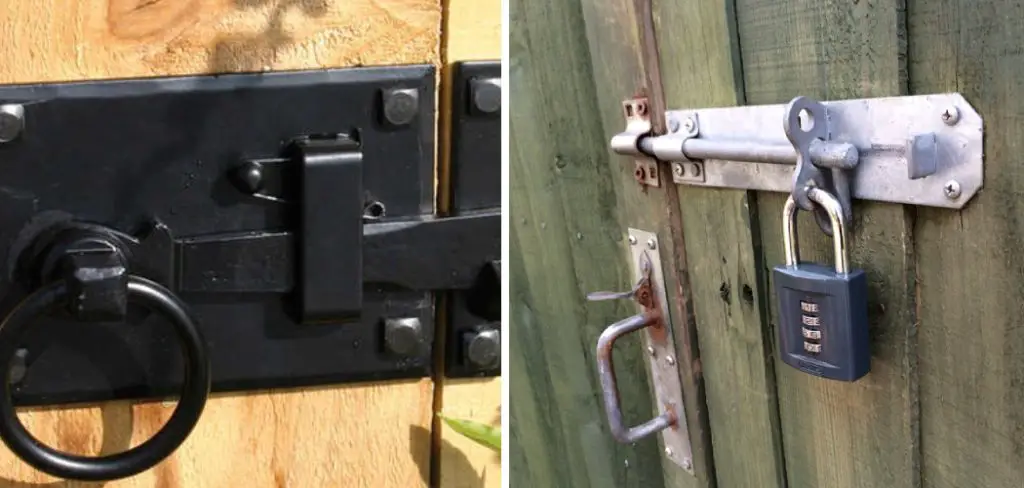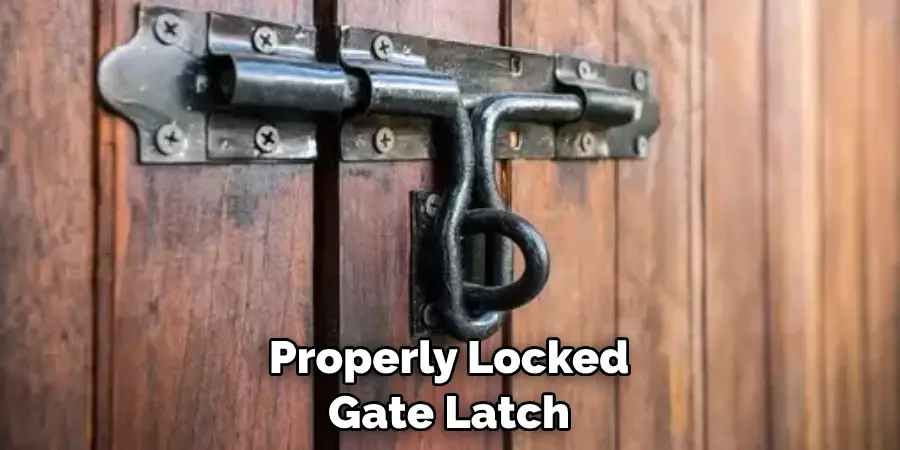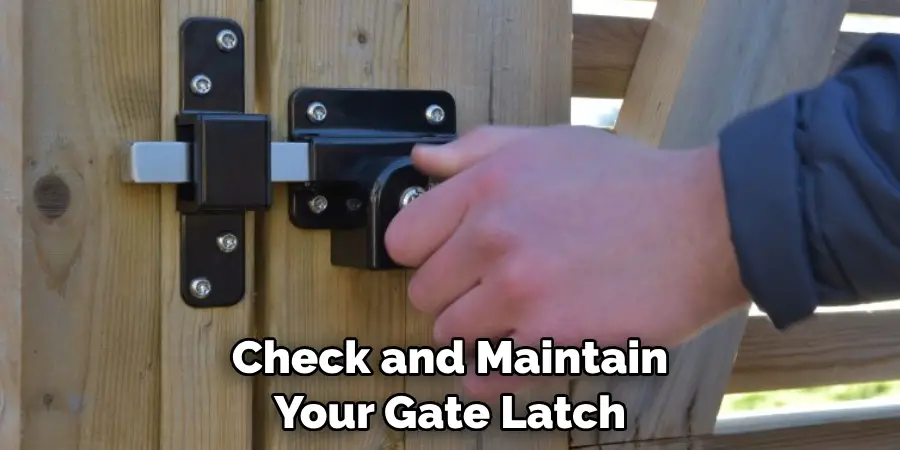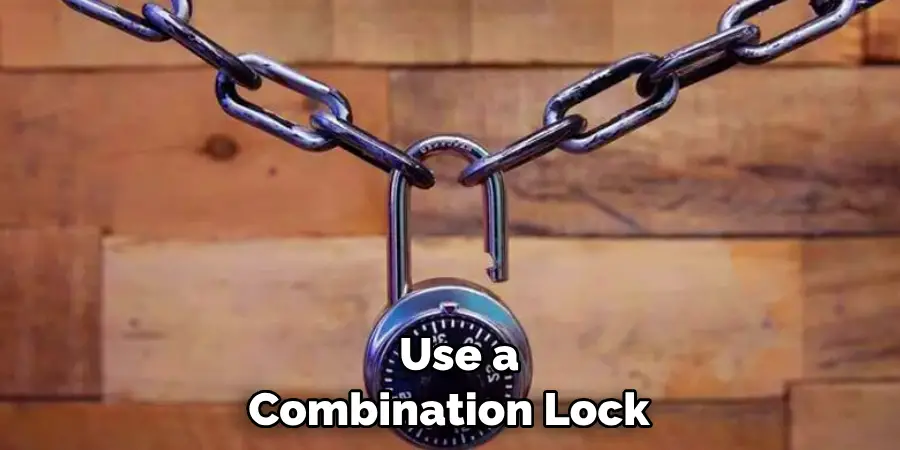Do you find yourself struggling to keep your gate secure? Maybe you’ve got curious kids, determined intruders, or just a poorly constructed latch. Whatever the reason for your security woes, this blog post is here to help!
We will walk through step by step how to lock a gate latch – from proper installation and maintenance techniques to choices of different locks that can give you added peace of mind. Keep reading and learn all about the important details of securing a gate with ease.

In this blog post, we’ll be walking through all of the steps necessary to ensure that your gate stays securely locked. Whether you’re a homeowner looking for some peace of mind or a DIY enthusiast looking for tips and tricks on installation, this guide has something for everyone. Ready? Let’s get started!
Why May You Want to Lock a Gate Latch?
1 . To Keep Your Property Safe
Locking a gate latch can provide an added layer of security for your property. It can prevent unwanted entry and keep intruders out, giving you peace of mind knowing that your belongings are protected.
2 . To Keep Pets or Children Safe
If you have pets or young children, keeping the gate latch locked can ensure their safety by preventing them from wandering off or accessing dangerous areas. This is especially important if you have a pool, pond, or other potential hazards on your property.
3 . To Maintain Privacy
Whether you’re hosting a backyard barbecue or simply enjoying some quiet time in your yard, having a locked gate latch can help maintain your privacy by preventing unexpected visitors from entering your property.
How to Lock a Gate Latch in 5 Easy Steps
Step 1: Choose the Right Gate Latch
Before learning how to lock a gate latch, it is important to choose the right one for your gate. There are various types of gate latches available in the market, such as self-latching latches, spring-loaded latches, and key-lockable latches.

Consider factors like the type of gate you have (wooden or metal), the level of security you need, and your budget when selecting a gate latch.
Step 2: Install the Gate Latch
Once you have chosen the right latch for your gate, it is time to install it. Make sure to follow the manufacturer’s instructions carefully. Generally, you will need some basic tools like a drill, screws, and a screwdriver. It is important to install the latch properly to ensure it functions correctly and provides adequate security.
Step 3: Test the Gate Latch
Before locking the gate latch, it is crucial to test it and make sure it is working properly. Close the gate and try to open it by pulling or pushing on the latch. If it opens easily, you may need to adjust the latch or secure it more firmly to the gate. It is better to identify and fix any issues before locking the latch.
Step 4: Locking the Gate Latch
Now that your gate latch is installed and functioning correctly, it is time to lock it. Depending on the type of latch you have chosen, there may be different ways to lock it. Some latches may have a slide bolt, while others may require a key or combination. Follow the manufacturer’s instructions for your specific latch to lock it properly.
Step 5: Regular Maintenance
To ensure your gate latch continues to function effectively, it is important to perform regular maintenance. This includes lubricating moving parts, checking and tightening screws, and making any necessary adjustments. Regular maintenance will not only prolong the life of your gate latch but also provide continued security for your property.
By following these 5 easy steps, you can learn how to lock a gate latch effectively. Remember to choose the right latch, install it properly, test its functionality, lock it securely, and perform regular maintenance for optimal performance.

With a properly locked gate latch, you can ensure the security of your property and loved ones. So, make sure to invest some time and effort into proper gate latch installation and maintenance for peace of mind.
Some Extra Tips to Lock a Gate Latch
1 . Do Not Leave the Gate Unlocked
One of the most common mistakes people make when it comes to locking a gate latch is leaving it unlocked. This may seem obvious, but it is easy to forget or assume that someone else will take care of it. Make sure to always double-check that the gate latch is securely locked before walking away.
2 . Use a Combination Lock for Added Security
If you want to add an extra layer of security to your gate latch, consider using a combination lock instead of a regular key lock. Combination locks are harder to pick and cannot be opened with duplicate keys. Just make sure to choose a unique and memorable combination.
3 . Keep Spare Keys in a Secure Location
It’s always a good idea to have a spare key for your gate latch in case you lose the original or need to give someone access. However, make sure to keep the spare keys in a secure location, such as inside your home or with a trusted neighbor. Do not leave them outside where anyone can find and use them.
4 . Regularly Check Your Gate Latch
Like any other lock, a gate latch can wear out or become damaged over time. It’s important to regularly check and maintain your gate latch to ensure it is functioning properly. This will help prevent any unexpected malfunctions and ensure the security of your property.

5 . Avoid Using Weak or Rusty Latches
When choosing a gate latch, make sure to select one that is strong and resistant to rust. Weak or rusty latches can easily be broken or manipulated, compromising the security of your gate. It’s worth investing in a high-quality latch for added peace of mind.
6 . Educate Others on How to Lock the Gate Latch
If you have frequent visitors or share a property with others, it’s important to educate them on how to properly lock the gate latch. This will prevent any misunderstandings or mistakes and ensure that everyone is on the same page when it comes to keeping the property secure.
Frequently Asked Questions
What Precautions Should I Take When Locking a Gate Latch?
When it comes to locking a gate latch, there are certain precautions that should be taken to ensure the safety and security of your property. Some of these precautions include:
- Regularly inspecting the gate latch for any damage or wear and tear.
- Use a high-quality padlock or key-operated lock instead of relying on a simple latch mechanism.
- Keeping the key or combination to the lock in a secure and easily accessible place.
- Installing a gate alarm system for added security.
- Teaching household members and visitors how to properly close and lock the gate.
Why Is It Important to Lock a Gate Latch?
Locking a gate latch may seem like an inconvenience, but it serves an important purpose in protecting your property. Some of the reasons why it is important to lock a gate latch include:
- Preventing unauthorized access to your property.
- Keeping children and pets safely inside the enclosed area.
- Deterrent for potential intruders or trespassers.
- Protection against theft of valuable items on your property.
How Do I Know if My Gate Latch Is Locked Properly?
To ensure that your gate latch is locked properly, follow these steps:

- Close the gate and ensure that it is securely latched.
- Insert the key or combination to the lock and turn/enter it.
- Test the gate by trying to push or pull on it – if it does not open easily, then it is likely locked properly.
- If you have a key-operated lock, make sure to remove the key after locking the gate.
Are There Any Tips for Keeping My Gate Latch Secure?
Yes, there are several tips for keeping your gate latch secure:
- Regularly inspect and maintain your gate latch to ensure that it is functioning properly.
- Consider investing in a high-quality lock for added security.
- Keep the key or combination to the lock in a safe and easily accessible place.
- Install a gate alarm system for extra protection against intruders.
Conclusion
In conclusion, locking a gate latch may seem like a simple task, but there are some important tips to keep in mind for optimal security. By following these extra tips, you can ensure that your gate latch is properly locked and your property stays safe and secure.
Remember, always double-check the lock, use a combination lock for added security, keep spare keys in a secure location, regularly check and maintain the latch, choose a strong and rust-resistant latch, and educate others on how to lock a gate latch.
Stay safe! So next time you find yourself needing to lock a gate latch, you’ll be well-equipped with the knowledge and tools to do so effectively. So don’t forget these extra tips and keep your property secure at all times!
